More online
For more information about Spring Commencement, go to http://www.umich.edu/~gradinfo/spring
A Michigan engineer pays it forward
Nicole Casal Moore
News Service
One Saturday morning as a fifth-grader, Christopher Boyd built a bridge out of popsicle sticks and decided engineering was cool.
Now, more then a decade later, he will graduate this spring with a bachelor’s degree in electrical engineering.
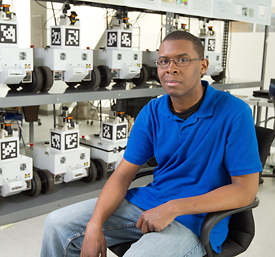
Christopher Boyd reaches out to fellow students through the M-STEM Academy. “Chris really has been a role model and a leader,” says Jeanne Murabito, executive director for student affairs at the College of Engineering. Photo by Eric Bronson, Michigan Photography.
He has spent much of his college career here giving back — trying to instill in his fellow students an excitement for the field and the skills to succeed in it.
“Chris really has been a role model and a leader,” says Jeanne Murabito, executive director for student affairs at the College of Engineering. “He has always been interested in helping others discover their passions and dreams.”
As a teenager at Cass Technical High School in Detroit, Boyd joined the robotics team. During his sophomore year in college, he mentored teens who were competing in the same national robotics competition at the Michigan Engineering Zone at U-M’s Detroit Center.
Boyd is part of the first graduating cohort of the Center for Engineering Diversity and Outreach’s M-STEM Academy, an intensive program designed to help students succeed. During his first two years here, that program, he says, gave him “training wheels” as he transitioned to the demands of the university. In the second half of Boyd’s time here, he coached incoming students through M-STEM and the National Society of Black Engineers (NSBE), at one point organizing a “how to study for finals” workshop.
“I know that when I came in to college, I was sometimes confused. Even in high school, whenever I wondered what I could do with engineering or my career, there were always older students who would tell me what it’s like and how to succeed,” says Boyd, who is in the process of deciding where to go for his doctorate in electrical engineering.
“I think it’s important to train the people who are coming up after you.”
Student helps build sustainable center in Brazil
By Maryanne George
LSA Communications
Julie Bateman wanted her education to have impact, so in 2009 when her friend Ethan Shirley proposed building a school and community center in the Brazilian Pantanal, a remote conservation region in western Brazil, it seemed like the natural thing to do.
With no money or business plan they began working to realize their dream of building a center with sustainable systems for a community of impoverished fisherman and cattle ranchers.
After nearly three years of strategizing, fundraising, back-breaking work, and collaboration with students and faculty across campus, the Pantanal Center for Education and Research (PCER) plans to open its one-room school house this summer.
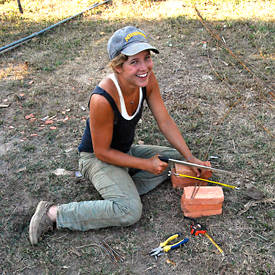
After graduation Julie Bateman plans to return to the Pantanal Center for Education and Research in rural Brazil before beginning a job with Bechtel Corporation. Photo courtesy Julie Bateman.
Bateman, who graduates this month with dual bachelor’s degrees in International Natural Resource Studies, an individualized concentration program through the LSA Honors Program, and a degree in civil engineering from the College of Engineering, says the project has been “a life-changing experience.”
“I was searching for something that would have an impact,” Bateman says. “Through this project I have learned that change happens slowly. But I now see that this could be a model for other communities.”
Bateman and Shirley, who graduated in December 2010, built a team of about 30 students and faculty from the Honors Program, CoE, the Multidisciplinary Design Program, Taubman College of Architecture and Urban Planning, School of Art & Design, Stephen M. Ross School of Business, English Language Institute, Center for Global and Intercultural Study and other campus groups. They raised more than $30,000 and traveled to the site in the summers of 2010 and 2011 to build the center.
PCER is built on land donated by Eduardo Falcão de Arruda, owner of the Jaguar Ecological Reserve, an eco-tourism lodge. The 8,000 square-foot building is equipped with a bio-sand filter to purify water, solar panels for the roof and a bio-digester is under development to provide gas for cooking.
After graduation Bateman plans to return to PCER, where work continues on a cellular-based Internet system and a new water tower. The team also plans to provide lodging for teams of researchers and open a medical clinic in the building in the near future.
In July she will begin a job as a project manager for the Bechtel Corporation.
Nursing senior: Sexual assault survivors ‘need my help’
By Jim Erickson
News Service
When School of Nursing senior Rachael Crowe tells people that she plans to become a sexual assault nurse examiner in Detroit, a common response is, “Why in the world would you want to do that?”
“Everyone thinks I’m crazy. Very, very few nursing school graduates end up doing this,” says Crowe, who will graduate this month with a bachelor’s degree. “But there is a huge need for sexual assault nurse examiners, and if you’re going to help people, then you need to go to the place that needs the most help.”
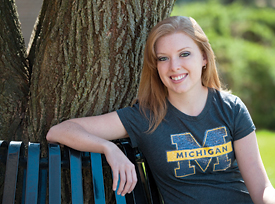
Rachael Crowe says she was drawn to work as a sexual assault nurse examiner because of her experiences with assault survivors. “These people need my help, and I want to be there for them,” she says. Photo by Scott C. Soderberg, Michigan Photography.
Sexual assault nurse examiners provide medical examinations and forensic evidence collection for survivors of rape and other forms of sexual assault. After obtaining her nursing license, Crowe plans to enroll in a training course for examiners offered by the Wayne County Sexual Assault Forensic Examiner’s Program. When she completes the course this fall, she’ll work on-call, responding to various Detroit-area hospitals.
Crowe, 21, said she was drawn to the work because she knows several rape and sexual assault survivors.
“It’s such a traumatic experience for them, and if they want to get evidence taken, they need to do it that same day,” she says.
“I was thinking about this and asking myself, What kind of person would you want to be your sexual assault nurse examiner? What kind of person does it take?” Crowe says. “You need someone who’s really kind and compassionate and patient and gentle. And somebody to coach you through it, really. And so I figured, I could be that person.”
Eventually, Crowe, who grew up in Beverly Hills, plans to return to school to get a master’s degree as a nurse practitioner, then work in women’s health. But for now, her focus is on becoming certified as a sexual assault nurse examiner.
“After getting a degree from such a great university, you really need to go out and do great things,” she says. “These people need my help, and I want to be there for them.”
Anthropology major reaches out through theatre
By Jared Wadley
News Service
Lais Duarte spends her Saturdays helping children learn about their identity and perceptions of racial biases. They incorporate dramatic readings and theatrical games to generate dialogue.
The children, whose ages range from 9 to 12 and come from Spanish-speaking families, are part of a project “Theatre, Racism, and Our Language: Dialogues and Diversions.”
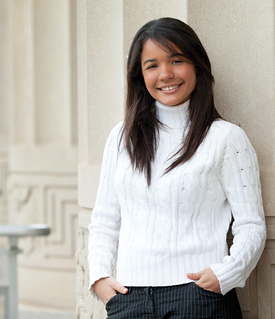
Lais Duarte, an anthropology major from Brazil, is part of a theatre project designed to inspire dialogue with children on identity and race. This fall she plans to attend grad school at New York University. Photo by Scott C. Soderberg, Michigan Photography.
Duarte, a senior anthropology major from Brazil, designed the program to explores questions of identity, race and the effects of racism all based from her own life experiences and community outreach.
“Lais’ academic record is first rate — she’s a serious scholar, and that makes it possible for us to collaborate on a variety of research projects,” says Teresa Satterfield, an associate professor of romance languages who has worked with Duarte for two years.
“But what makes Lais an unequalled force standing out from her peers is her tremendous sense of humanity and unwavering commitment to positive change.”
This unwavering commitment, Duarte says, comes from her late mother, who taught her by example how to be a confident and reflective woman. She also credits her early years as a theatre performer in an after-school program trying to make a difference in disenfranchised communities. The setting in her native country Brazil, and lessons learned, still resonates with her 10 years later.
“I can still smell the mixture of the old wooden floor, sweat and the glue, which we used to produce our mamulengos (puppets),” says Duarte, 22. “I remember exhaustively repeating my lines until I had memorized them perfectly. This experience helped to shape me into a persistent person.”
Her main project, “Hora do Rush,” consisted of bringing street performances to public and private spaces — such as bus stations and cafeterias — that were not regularly used for cultural activities. The performances involved topics ranging from domestic violence to child labor violations.
At U-M, she also participates in the Undergraduate Research Opportunity Program, which creates research partnerships with students and faculty.
This fall, she plans to attend graduate school at New York University, where she will write and direct performances about social issues affecting the underprivileged in Brazil and other developing countries.
Collins pursues passion with chemistry, music
By Maryanne George
LSA Communications
As a child Sean Collins nurtured his love of classical piano. In high school he developed a passion for chemistry. Unable to choose between the two he decided to study both when he enrolled at U-M in 2007.
This month he will earn dual bachelor’s degrees in chemistry and music. Earning two degrees in five years meant heavy course loads and long hours in the laboratory and at the piano. But Collins readily embraced the challenge.
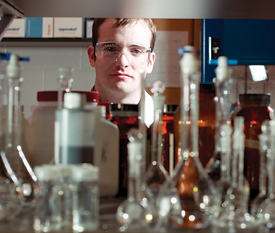
Sean Collins studied both chemistry and piano, and this month will graduate with dual bachelor’s degrees in both areas of study. Photo by Eric Bronson, Michigan Photography.
He majored in materials chemistry and has done research on projects related to the development of solar energy. Stephen Maldonado, an assistant professor of chemistry, LSA, whose research focuses on solar energy and materials science, remembers when Collins volunteered to work in his lab in the fall of 2009 without pay or credit.
Collins already had developed skills in electron microscopy during summer internships at the National Institute of Standards and Technology in Washington, D.C., and thought they might be useful for research projects in Maldonado’s lab. He has worked in the lab ever since.
“I was impressed by his level of forethought and maturity, his recognition of a needed skill set in my group and his deep interest in my group’s area of science,” Maldonado says. “I happily accepted Sean’s offer and have been thoroughly rewarded several times over. Sean is one of the most dedicated, gifted, and careful student researchers I have ever mentored or worked with.”
In recognition of his talent, Collins was awarded a Goldwater Scholarship in 2011. After graduation he will pursue a doctorate in materials science at Cambridge University, in Cambridge, England, where he was awarded a Gates Cambridge Scholarship.
On campus he was active in the LGBT community and served on the LGBT Issues Commission of the Central Student Government and an advisory board in the Division of Student Affairs. He also was co-director of the Midwest BLGTA College Conference, which was held at U-M last year.
Collins plans a career as a scientist developing solar energy and other forms of sustainable energy.
“This is a make-or-break moment in energy research,” he says.
Ross School student finds success in bicycle taxi service
By Amy Spooner
Stephen M. Ross School of Business
For Calvin Schemanski, who this month will earn a Bachelor of Business Administration from the Stephen M. Ross School of Business, the lure of Football Saturdays wasn’t the maize-and-blue merriment that permeated the university. He saw dollar signs.
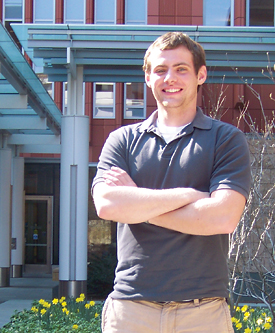
Calvin Schemanski and a friend got the idea for a bicycle taxi service while living in Petoskey. He eventually opened Ann Arbor Pedicab and was named 2012 BBA Entrepreneur of the Year. Photo by Amy Spooner, Stephen M. Ross School of Business.
Schemanski, owner of Ann Arbor Pedicab, shuttled fans around campus and downtown with his fleet of bicycle taxis. And he worked hard for the money. Memorable riders include three Marines of sizable stature, newly returned stateside. “They initially wanted a ride to the bar after the game,” he says. “But they had so much fun riding around and whooping at people, that they kept me going for over an hour. It was exhausting.”
Ann Arbor wasn’t Schemanski’s first foray into pedaling for pay. He and a friend launched Petoskey Pedicab in their hometown in spring 2009, and Schemanski became sole owner the following year. The cross-country athletes had bounced around ideas for a business that would build sweat equity along with revenue, and ultimately landed on the rickshaw-style transportation concept after seeing it in a larger city. “We kept bringing it up as a joke but eventually realized it wouldn’t cost much to launch. And it was a better alternative than working in some fast-food kitchen all summer,” Schemanski says.
But launching and running his own business has given Schemanski more than a pass to avoid the deep fryer. He’s learned firsthand how to fine-tune marketing strategy, grow his operation, manage a mobile workforce and even argue in court for the right to display advertising on his cabs.
Schemanski hasn’t always identified himself as an entrepreneur. In fact, he came to the Ross School to pursue finance, arguably the opposite end of the spectrum. Now he’s the 2012 BBA Entrepreneur of the Year. Since he’s been bitten by the entrepreneurial bug, he will work at a social media startup after graduation. “The element of the unknown is exciting,” Schemanski says. “I love the idea of doing something that no one’s done before.”
Performing arts major ‘different kind of musician’
By Deborah Holdship
Michigan Today
Speak to any artist and you’re sure to hear about that curious phenomenon known as the “happy accident.” For Chris Dupont, a 2012 recipient of the Performing Arts Technology degree in the School of Music, Theatre & Dance, it came by way of sheer procrastination.
For one assignment, Dupont was required to submit a recording devoid of digital reverb. He’d neglected to reserve studio space and, with the deadline fast approaching, found religion. Literally. He finished his assignment in a local church.
“You’ve never heard violin sound better,” Dupont says. “Churches just sound so sweet. They give you this big, natural reverb you can’t get anywhere else.”
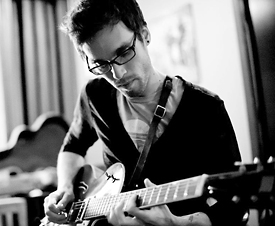
While at U-M, Chris Dupont says he stayed busy playing shows, doing session work in studios, recording his own tunes, releasing a solo album, and composing for student films and dance pieces. Photo courtesy Chris Dupont.
Dupont has since carved a niche recording in such unusual spaces as stairwells, theaters, and abandoned barns. His album “Lay No Claim” features beats made entirely of “found sounds,” like stomping noises and breaking objects. His followup, “Anxious Animal,” is more organic, complete with violin and cello.
The modern folk-based singer-songwriter from Grand Rapids counts influences from ambient to R&B (with a dash of Bonnie Raitt, Brian Eno and Bon Iver thrown in for good measure). His time at U-M transformed his creative process and changed him in unexpected ways.
“We did the weirdest things,” he says of the Performing Arts Technology curriculum. “But it was also very disciplined.”
And collaborative. Dupont now counts filmmakers, dancers, DJs and producers among his diverse and eclectic peer set. During his time in the program, he twice earned best original score at the annual Lightworks Film Festival presented by the U-M Film and Video Student Association. He also composed music to support a friend’s choreography thesis.
“It’s especially liberating to do things that are not about me,” he says. “It’s so pleasing to know your work helped someone else. It makes you a different kind of musician.”
But Dupont emerges from the program with more than just artistic skills.
“I’m equipped with the ability to multi-task, work with deadlines and constantly strive to improve my own work,” he says. “I’ve learned how important it is to seek out talented people, and learn everything I can from them. In a changing music industry, no one survives alone.”

